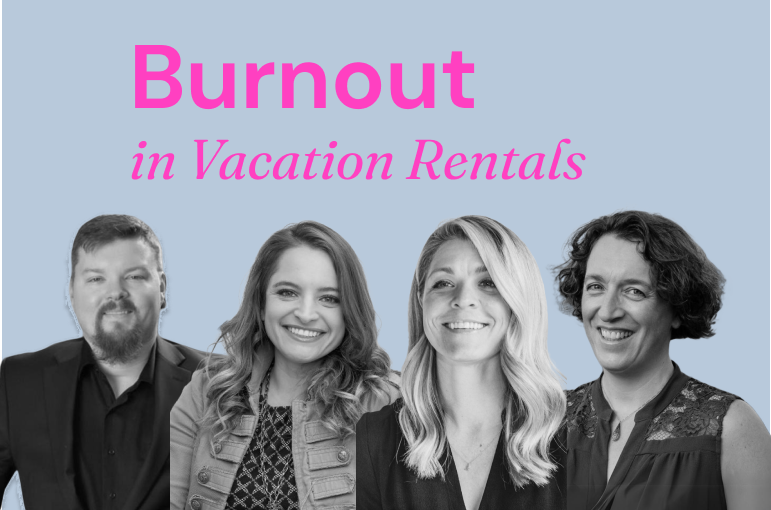As a host or property manager, you are always ‘on’, 24-7, 365 days per year – and if you’re not well prepared or don’t have the right support, you could be vulnerable to burnout in vacation rentals, a phenomenon which is often over-looked and not openly discussed.
In this post, we talk to several vacation rental experts about vacation rental homeowner burnout and property manager burnout and what you can do to lower your risk.
Also, watch our video interview with Annette Grant and Sarah Karakaian of the longstanding and super popular podcast about their personal experiences of burnout in vacation rentals and for practical advice to minimise homeowner stress.
Signs you suffer from Airbnb host burnout
Airbnb burnout has the same symptoms as burnout in other industries, including:
- Physical fatigue
- Emotional exhaustion
- Feeling constantly stressed
- Lacking enthusiasm or passion for your job
- Feeling overwhelmed or inefficient
- Wanting to quit
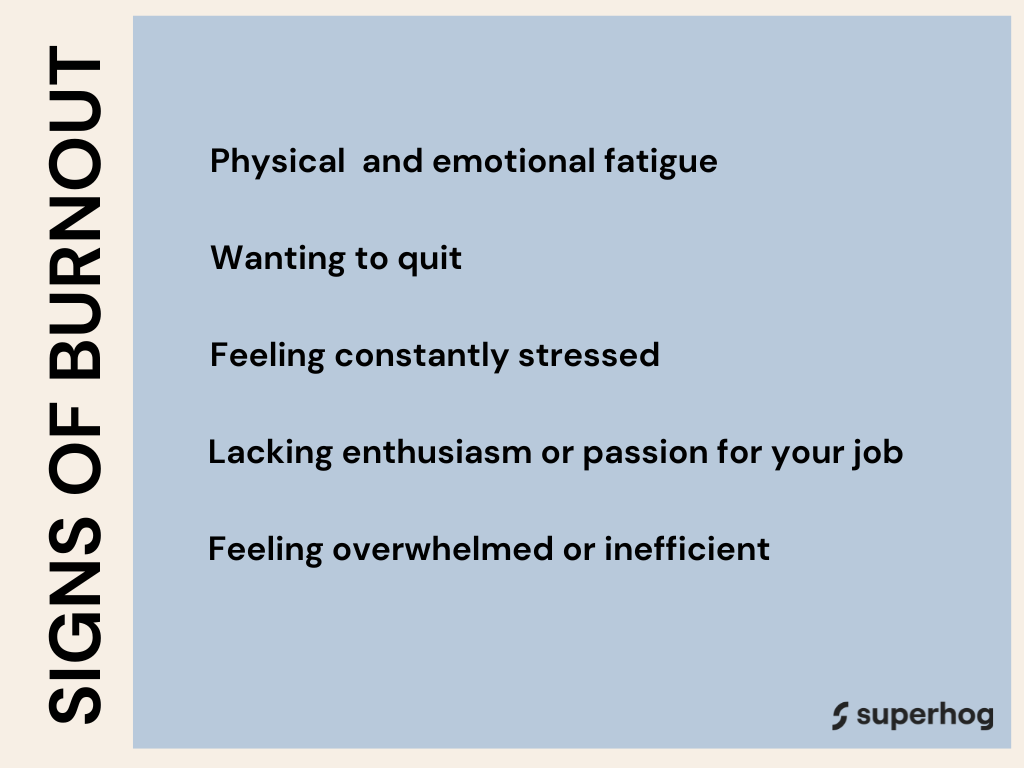
Sarah Karakaian, who experienced property manager burnout, says:
“I noticed it when responding to my team or responding to guests, I didn’t have that same hospitable tone or that same solution-based mindset I usually have. And that’s when I knew. I worked too much. I was on too much. So if you notice yourself getting there too, it’s time to stop and see how you can restructure everything so you can get some time off.”
Matt Landau’s burnout experience – ‘It’s not such a negative thing’
Celebrity host and educator Matt Landau, has also spoken publicly about his experience of burnout in vacation rentals. In an interview with PMS provider Lodgify, he said:
“I burned out myself. After some time someone challenged me. They said ‘You’re not as passionate as you were in the beginning. It’s time to get out.’ ”
For Matt, it was important to keep a positive perspective.
“Looking at burnout as a terribly negative thing is not fair – people burn out in relationships, people burn out from where they live, in businesses. It’s not necessarily a bad thing.” says Matt.
Burnout can be the push you need to change something in your work environment, your life or to learn something new.
What are the risk factors for Airbnb fatigue?
You’re not prepared to be ‘on’ all the time
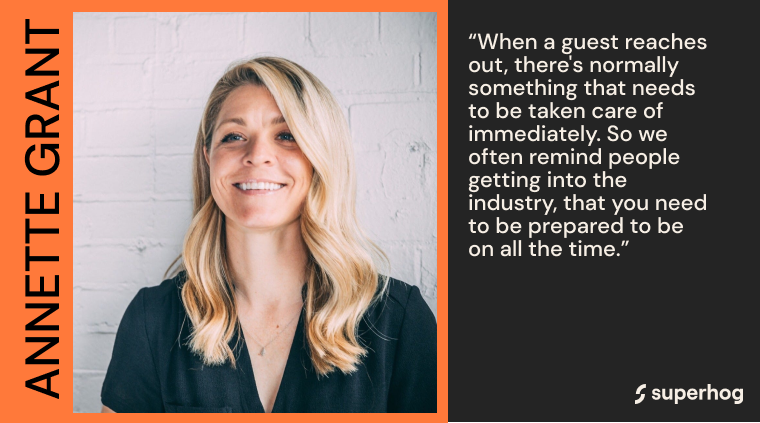
Annette says: “Whereas parts of hosting can be part-time, it really is all the time. So, depending on your calendar, you are on 24 seven, 365… When a guest reaches out, there’s normally something that needs to be taken care of immediately, even if it’s in the middle of the night. So we often remind people getting into the industry, that you need to be prepared to be on all the time.”
You expect a passive income
Another problem, according to Annette and Sarah, is that many hosts go into the industry with the wrong mindset – expecting to earn a ‘passive’ income. When they discover the reality of how ‘active’ short-term rental investing can be, they become much more susceptible to burnout or burn out quicker.
You wait too long to hire a team
“We usually think we can do everything better than everyone else, so we don’t delegate. I was spinning plates for a long time and then they crashed and that was not fair to my guests. Many of us appoint a team way too late and our guests suffer. We don’t want that to happen because the whole short term rental industry suffers when that guest has a bad experience. So we’ve got to try to get ahead of the burnout.” says Annette.
You are a co-host or solo-preneur
Sarah said: “When you start, you’re in a honeymoon phase where you are jazzed getting a message from a guest. Even if there’s a problem, you love solving that problem. It gives you life, it gives you energy. But around the year and a half, two-year mark, you’re growing and you can’t afford to bring on all the help or tech you’d like, or you don’t know if you can afford it because you haven’t looked at the numbers. You’re spinning plates. That’s when it can backfire if you don’t have a solid support system, a team, or a co-founder. If you’re truly on your own, it can get pretty dark pretty fast in terms of how you’re feeling and seeing a way out.”
You are an owner-operator
For many homeowner-operators who own every glass and spoon in the property, it heightens the sense of burnout because everything feels much more intense and personal, says Annette.
Also, for vacation rental hosts who own their properties and try to secure direct bookings, it is difficult to admit when they’re struggling because the business, team and their guests depend on them and they need to be seen to be positive.
How to reduce your risk of Airbnb host burnout
1. View your short-term rental as a business
Most vacation rental hosts are accidental hosts first, so planning is often an afterthought, but one of the key things experts agree on, is that you should view your short-term rental as a business.
“The day you open your door and accept money for an overnight stay, you are a business, even if it’s part-time and it’s your property. You are a business owner and you need to treat it like a business,” says Annette.
Matt agrees, “Viewing your rental as a business changes the entire lens – you look at things differently – you have a business plan, marketing plan, accountant, operational plan – suddenly you have a path, guide posts, things to look at – to know if you’re making progress. You can tell if you’re on the right path as opposed to – and this was me to a degree, not having a plan… and even when things go well, you begin to drift and wonder ‘What am I doing?’….”
2. Be in control of your calendar
Not everyone has the luxury of taking time off, but Sarah advises hosts and managers who have the flexibility to have a tight grasp on their calendar and their personal lives, making time for themselves and their team members.
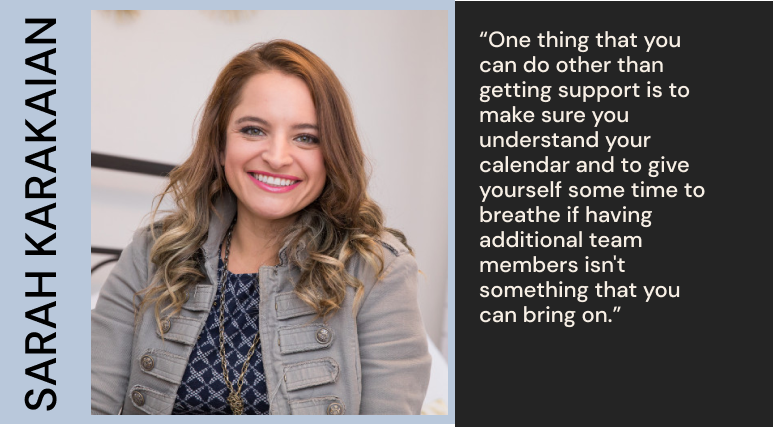
“We know hosts that do have some flexibility and they might take a week off like normal businesses do. Put that sign on that front door and say, we are shut down right now for holiday or whatever that is. So that’s one thing that you can do other than getting support is to make sure you understand your calendar and to give yourself some time to breathe if having additional team members isn’t something that you can bring on,” says Sarah.
3. Hire help before it’s too late
Annette tells this tale of how she hit ‘rock bottom’ to illustrate the need to get help early.
“This was several years ago when I was doing everything on my own, including messaging and cleaning. One day a guest messaged me to say they’d arrived. I checked and sure enough, they had booked and I had missed it because I had multiple properties and did everything manually. I hadn’t yet cleaned that property. In the end, honesty was the best policy. I apologised, cleaned the property, paid for their dinner and they gave me grace. But nowadays I do not think that would fly at all. I hired someone the very next day to help me because I did not ever want to feel that way again.”
Saskia van der Bolt, owner of Villa Umbria in Italy, who manages 50 self-catering properties as a one-woman company, agrees. “Outsourcing some tasks to other people or companies is a big help. For example, I have outsourced social media management and this works really well.”
Read Saskia’s success story.

4. Use tools & automation, but choose wisely
Save time and reduce stress
Saskia uses Superhog’s damage waiver automation to handle potential guest damages without the need for upfront deposits. This automation significantly reduced the administrative burden and provided peace of mind, allowing her to focus on enhancing guest experiences rather than managing damage claims.

Cody Wood, COO of STR Accommodations in the US, also uses technology to efficiently communicate all the details of his guests’ stay.
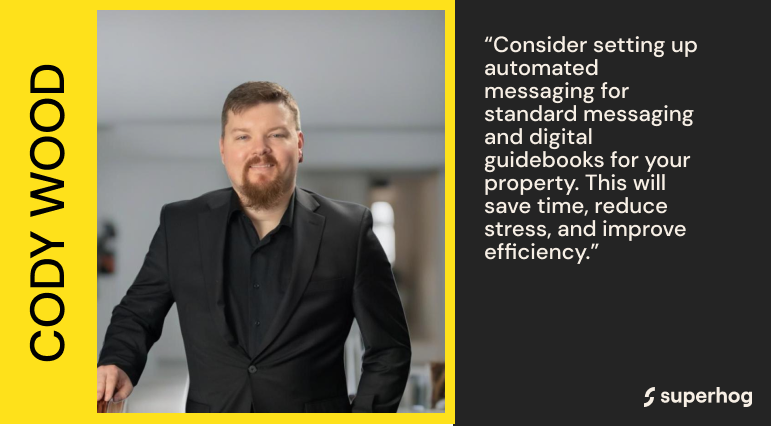
“Prompt responses and clear instructions enhance the guest experience and make the process from booking to review seamless for the guest. Consider setting up automated messaging for standard messaging and digital guidebooks for your property. PMS tools automate tasks, manage reservations, and track tasks. You can also link other tools to complement your operations. This will save time, reduce stress, and improve overall property management efficiency,” says Cody.
Read Cody’s success story.
Avoid shiny object syndrome
A word of advice, though, from Annette – to choose your tools wisely.
“Technology can actually cause burnout because so many hosts want to layer on all of the technology and they don’t understand any of it. And that actually leads them to think they should be doing more, better, faster. There is a lot of technology out there and you have to make sure you bring it on at the right time and that you really need it.”
Apart from the cost of technology, every new tool also adds on a learning curve that can leave you exasperated if you already feeling a little stressed, she adds.
The basic tools every manager needs The baseline tools Sarah and Annette advise first-time hosts to invest in are automated messaging, a dynamic pricing tool and an automated property care and operations tool that acts as your one source of truth.
About guest messaging, Annette says, “You want to ensure each guest is getting the same tone. They’re getting the same thought out hospitality driven messaging, not a stressed out, ‘I’m at my kids soccer game, why are you asking me this question?’ message.”
5. To scale or not to scale… know when is right for you
Beware of the messy middle!
Sarah says: “I don’t care how much you invest in courses or a coach, there is going to be a messy middle when you scale. I think it can be less messy and you can be more supported, but just know it’s hard. If it wasn’t hard, everyone would do it. Also, I do believe that 10X your business is a lot easier than staying super small.”
Know your numbers
For owners with fewer than 10 properties, who still do many tasks themselves, it is essential to plan carefully when you scale.
“Ask yourself, if I bring on another five houses over the next, six months, that’ll give me this much extra revenue. And if I bring on a person at this salary or at this hourly rate who can help me, how does that shake out? The more you plan, the more you know what to expect when you do start adding those properties.”
Don’t underestimate onboarding
Some people don’t realise that it’s not easy to just ‘add’ a property. Even if the property is furnished, you still need to plug it into your system, whether you’re training your cleaners or getting it plugged into all the technology. It usually takes more time than you think it does,” says Sarah.
Scaling means less money at first…
Annette stresses there is actually often less money initially when you’re scaling because you need to invest in the business and in your team and your personal revenue often declines.
“Scaling does not increase the bottom line for quite some time. If you’re willing to go through that absolutely do it, but be aware scaling doesn’t automatically increase your bottom line. Volume is vanity, profit is sanity,” she says.
6. Set boundaries for guests
This is all about setting expectations and meeting your guests where they’re at, Annette and Sarah say. Be very clear about boundaries in your communication and mention it in many different places.
“For example if a guest calls us after business hours, they immediately get a text to remind them, ‘You reached out to us outside of business hours. If this is an emergency, here’s what to do. Whether it’s to call 911 or if there’s something that only our team can take care of, we have backups for our backups so guests can help themselves.”
7. Find balance… your way
Make time for yourself
For Saskia of Villa Umbria, it’s important to take time out every day.
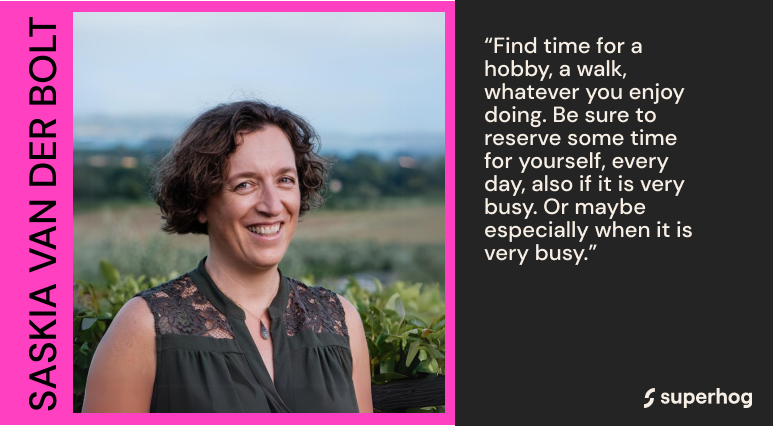
“Find time for a hobby, a walk, whatever you enjoy doing. Be sure to reserve some time for yourself, every day, also if it is very busy. Or maybe especially when it is very busy,” she says.
For Cody setting boundaries is very helpful in juggling everything.
“I defined my specific work hours to avoid them extending into personal time. I set up focus times on my phone so I wouldn’t be notified during my personal time and get sucked back in to work,” he said.
Prioritising self-care is also really important to him.
“I established a morning routine and take regularly scheduled breaks throughout the day to clear my mind. Remember both your physical and mental well-being impacts you and your business.”
But, don’t stress about self-care
Sarah agrees, but warns that self-care shouldn’t add to your stress.
“Self care doesn’t have to mean hour long massages and completely unplugging. It can be as simple as your morning cup of coffee, where you do five minutes of just focusing. Go with what makes you feel good. Don’t try to follow the trends of self care.”
8. Talk to some-one who understands your pain…
Network and stay up-to-date with industry trends
All the short-term rental experts agree networking and peer support is essential. Whatever you do, don’t try to do it alone.
Cody stays up to date with trends and insights listening to industry podcasts.
Sign up to our podcast – The Property Manager as Guest and sign up to our monthly LinkedIn newsletter for trends and insights.
“I also attend local meet-ups or travel events where like-minded individuals will be. This provides opportunities to learn, grow, and potentially collaborate with others in the field. Often you will be pitched many different products/classes – I would caution to evaluate whether they align with your business needs, and not to get shiny object syndrome.”
Joining or creating a mastermind group with operators from different regions for more regular meetings, is something else he recommends. “We discuss challenges, explore opportunities, and share resources.”
For Saskia networking is crucial.
“Network with your peers, other property managers, or house owners in your area. They encounter the same issues. It is good to have their feedback or just to have a chat now and then, to realize you are not on your own. You may also be able to set up a network to agree on some common tasks you can share. Cleaning? Marketing the area you are in? Any common tasks you can organise together.”
Speak to people who ‘get’ you
Annette has the final word on this.
“Find a person or people who are in this lifestyle and who have the same highs and lows that you can be open with. It’s not the same to tell your spouse or best friend who has nothing to do with short-term rentals. They won’t get it. Finding someone who actually understands your pain and your day-to-day struggles is crucial to prevent burnout and to support you during a burnout.”
Conclusion: Burnout in vacation rentals is real, but there is hope
If you’ve ever wondered ‘Is being an Airbnb host stressful?’ this post shows the reality of what it means to be a vacation rental host or property manager.
It’s not easy, for sure, and there are many pitfalls, but if you follow the advice of the experts in this article – you have all the tools you need to take pro-active steps towards a healthier work-life balance and to prevent yourself from suffering from homeowner stress or homeowner burnout.
But if you DO end up feeling burned out, it’s not the end of the world. Don’t be too hard on yourself. You are not alone. Even these celebrity hosts have been there and look at them now!
View it as a positive sign that something needs to change… and get the help and support you need to change your business and your life for the better.

